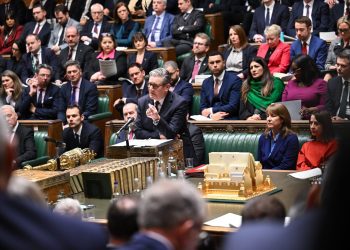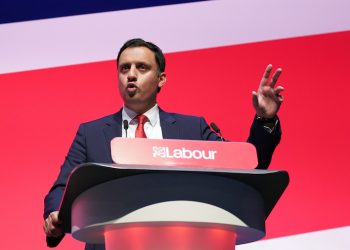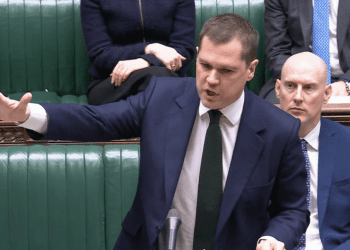“Now, the Tories – do you remember them?” Keir Starmer had spoken for a full 50 minutes before acknowledging the existence of Labour’s historic rival. The line was met with laughter – a fleeting moment of levity in an otherwise headstrong conference speech.
Even then, Kemi Badenoch’s party was reduced to a rhetorical device, rather than treated as a meaningful political threat. The Conservatives did not stand up to “grievance politics” in their 14 years in government, Starmer observed. He would. With that, the prime minister delivered his peroration and returned to more pressing matters: the rise of Reform UK.
Yet the speech’s cursory consideration of the Conservative Party was, in effect, its logical foundation. The rump Tory party, exhausted and misled, was dismissed as obsolete. Labour would focus its energy on the forces that devoured it.
Starmer’s conference address was an analysis of the political landscape, its recent redevelopment, its faultlines – and a statement of where Labour under his leadership would stand within it.
Nigel Farage was the speech’s antagonist. And Starmer portrayed his role in Britain’s political drama with unprecedented clarity. The Reform UK leader was characterised as a harbinger of division and decline; derided as a politician who neither understands his country, nor much likes it; and cast as an arch-opportunist, who cynically exploits grievance for his own career ends.
The prime minister called out the “self-appointed champions of working people” and spoke of “a fight for the soul of our country”.
He declared: “If you say or imply that people who have lived here for generations can’t be English because of the colour of their skin, people who made their lives here… we will fight you with everything we have because you are an enemy of national renewal.”
Starmer positioned Labour as both Reform’s antithesis and antidote. He defined the nature of the populist threat, and presented a theory to explain its moral failings.
In other words: Starmer told a story.
“That was me”, the prime minister is said to have confided to friends moments after delivering his speech. Therein lay the political power of the address: its simplicity, its unapologetic authenticity.
With his speech, Starmer intervened in the long-running debate over what he actually stands for. The prime minister had once been reticent to rectify this ambiguity. Perhaps his strategists reasoned that storytelling was not his strong suit, or that politics had somehow evolved beyond the need for narrative. Whatever the calculation, events have shown it to be wrongheaded.
The prime minister’s previous attempts to address his lack of political substance only muddied matters. Starmer took to the conference stage on Monday with his programme still couched in managerial nomenclature: his collection of “pledges”, “missions”, “first steps”, “milestones”, “foundations” and “phases”.
Some of these formulations had already been reneged upon. But others were left languishing in a liminal state of simultaneous existence and non-existence: neither explicitly committed to, nor formally forsaken. From 2023 to 2025, the more the prime minister tried to distill his political offer, the less accessible it became. Somewhere in this managerial milieu, of course, resided the government’s “plan for change”.
Starmer’s conference speech entirely avoided such constructions.
From the outset, Starmer levelled with the electorate by foregrounding a clear narrative. Speaking plainly matters in politics. 10 pledges, six milestones, six first steps, five missions, three foundations and two phases are no substitute for singular purpose. There was a finality to the conference address, therefore. The chronic carving up of Starmer’s politics into categories was never exactly compelling; it lacked genuine commitment. There was no indication of political definition, direction or denouement. Starmer’s address was different.
***Politics.co.uk is the UK’s leading digital-only political website. Subscribe to our daily newsletter for all the latest news and analysis.***
The final phase
The prime minister’s lack of political definition infused his government. Policy announcements seemed random, bereft of any overarching programme.
More pertinently, political stories matter – especially in a fractured and highly competitive political landscape – because they dictate the battles a party picks. Managed conflicts are a means by which parties project their values to voters. Without a narrative, parties are drawn onto the territory of their opponents and forced, in effect, to triangulate to survive. Instinctively sympathetic voters are left isolated.
Political stories are also significant in setting the boundaries of a leader’s authority. A narrative provides the connective tissue that holds a government’s priorities, policies and personnel together. It invites frontbenchers and backbenchers alike to identify with a common mission. Without one, orders emerging from the centre appear disjointed and incoherent. MPs who want to be heard are left to freelance. With a story, loyal MPs are incentivised to work towards their party’s leadership on its terms.
Approved narratives, equally, serve as an instruction to the leader’s inner circle. Consider Starmer’s “islands of strangers” debacle: the prime minister’s decision to row on the speech suggests his own speechwriters – apparatchiks employed as experts in their subject’s mind and voice – did not understand his politics. The conference speech, which narrated the nature of Starmer’s challenge to Reform, will stand as a guide for his No 10 coterie.
And without a narrative, otherwise manageable crises – like the loss of Downing Street personnel – appear somehow existential. A government that exists, ostensibly, to ensure the favourability of the daily news cycle will find itself disproportionately distressed by relative dips. The lack of a narrative has informed the brittle quality of Starmer’s premiership.
Indeed, when the going gets tough, a political North Star can serve as a guide – setting the terms of strategic retreats and/or pointing a government to safer territory.
For the first time in months then, Starmer’s speech has given his premiership a sense of forward momentum. The address has created a permission structure for his cabinet outriders to take on their opponents with evermore uncompromising rhetoric. Consider Ed Miliband’s comprehensive castigation of Elon Musk in these terms. One already senses the shift from cautious managerialism. A much-needed edge has been added to the government’s communication.
The response of Reform, reactive and not a little tetchy, should harden Starmer’s strategic resolve. Farage’s hastily arranged presser suggested he had been thrown off balance by the conference address – as did the substance of his response. His fightback incorporated strained suggestions that the Labour leader had set out to incite violence against Reform. As Zia Yusuf, the former Reform chair, put it on Tuesday: “The prime minister knows precisely what he’s doing.
“He knows he cannot beat Nigel at the ballot box, we’ve seen the most extraordinary campaign over 48 hours to demonise Nigel, and he is absolutely inciting violence against him.”
***Politics.co.uk is the UK’s leading digital-only political website. Subscribe to our daily newsletter for all the latest news and analysis.***
The anti-Farage front
There are unavoidable risks with Starmer’s strategy, that said. The approach speaks simultaneously to progressives, to traditional conservatives and to the Reform-curious so-called “hero” voters Labour secured in 2024 – all with a view to constructing an anti-Farage popular front. It seeks to persuade those who are implacably opposed to Reform’s politics that Labour is the only vehicle that can thwart Farage. At the same time, it engages in an argument among the Reform-curious about the moral damage the party would wreak were it given the chance – an attempt to effectively delegitimise and re-stigmatise the party.
The “moral line” strategy is a deliberately unsubtle solution, therefore, to a rapidly fragmenting electoral landscape. The apparent aim is to appeal to enough of its target audience (the anti-Reformers and the Reform-curious) to build the kind of broad-but-shallow electoral coalition Starmer constructed in 2024.
The questions as to whether this strategy can work are manifold, and multiplying. How will voters respond to the prime minister’s transition from details-focused arch-pragmatist to a lectern-thumping preacher-politician? Can Starmer authentically style himself as the leader of a British popular front – à la Emmanuel Macron in 2017 and 2022? Will progressives really rally to Labour’s cause when arguably better ideological fits, in the form of Zack Polanski’s Greens or the Corbyn-Sultana project, exist?
In any case, is this the best Labour can do in government: emerge as a repository for reluctant anti-Reform votes? And what if Starmer succeeds in talking up the threat of Reform, inspiring further coverage and diminishing any Conservative comeback, but fails to take them down?
Will stigmatising Farage catch his voters in the crossfire? Can Starmer differentiate his target audience, the Reform-curious electorate, from the Reform leadership? Farage will try his utmost to sow confusion; he excels in twisting the meaning of such stances to suit his standing.
The fight Farage strategy, as we have addressed, leaves room for impassioned improvisation. That is the instruction Starmer handed down in Liverpool. And yet, David Lammy’s intervention just hours after the PM delivered his speech was a conspicuous blip in an otherwise roundly successful afternoon. The deputy prime minister was forced into a hasty about-face after he claimed Farage had “flirted with Hitler Youth”. Labour must remain relentlessly aware of the traps and unforced errors that Farage so excels at exploiting.
But the riskiest element of Starmer’s pitch is his message to those who declaim Britain as “broken”. The PM, despite his previous declarations to the contrary, says he does not “accept” this characterisation. This position risks coming across as insecure, insincere, and – Reform will posit – out of touch.
Farage’s success in recent months has been to associate Starmer and the Labour government with a status quo that voters roundly regard as having failed. The prime minister now risks playing into this conception by defending what he used to demean as “broken”. Starmer’s story about Britain’s moral character, and threats to it, should not relegate concerns about its material condition.
Such is the narrative conflict that will define our politics, quite possibly, until the next general election. Starmer’s frame, that of division vs renewal, is now in direct competition with that advanced by Farage: that of insurgent outsider vs the broken status quo.
The prime minister has begun the process of piecing together his premiership, fractured as it has been by infighting, incoherence and policy reversals. And yet danger still awaits: a pivotal budget and perilous May elections could rupture this nascent sense of momentum. Farage will not let up.
In his conference speech, Starmer appeared to find his calling. His ability to answer it now looks set to determine his political fate.
Josh Self is editor of Politics.co.uk, follow him on Bluesky here and X here.
Politics.co.uk is the UK’s leading digital-only political website. Subscribe to our daily newsletter for all the latest news and analysis.
The post Week-in-Review: The calling of Keir Starmer appeared first on Politics.co.uk.
































